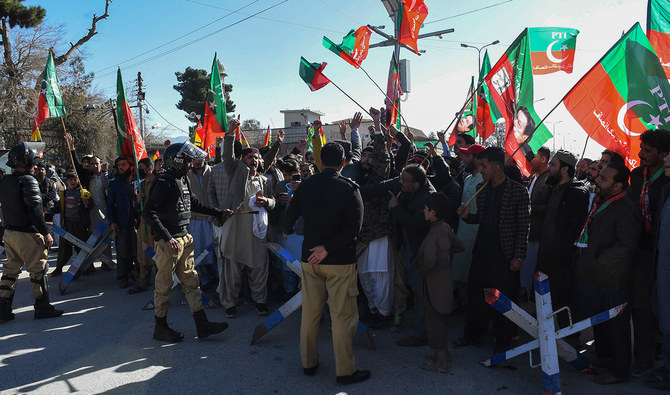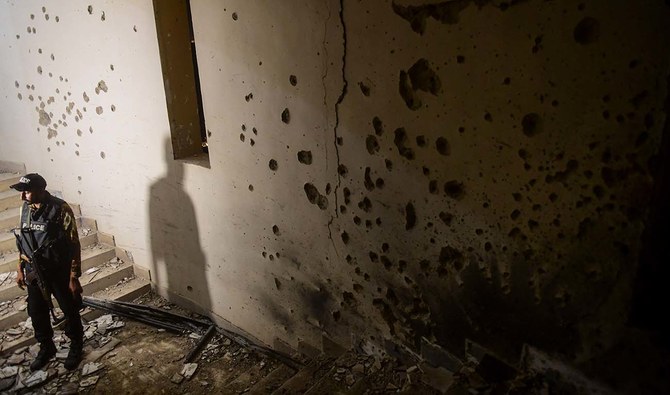PESHAWAR/KARACHI/QUETTA: At least three people were killed and 12 others injured, police said, during a protest by supporters of the Pakistan Tehreek-e-Insaf (PTI) party against the results of a National Assembly seat in Shangla district in northwestern Pakistan on Friday.
Engineer Amir Muqam of the Pakistan Muslim League Nawaz (PML-N) party won over the PTI-backed candidate Saeed Farin for the National Assembly seat NA-11, against which PTI supporters organized a protest in Shangla on Friday, saying the results of the count had been altered.
“The protesters got violent and pelted stones on the police as a result of which four police were injured,” a spokesperson at the local police station told Arab News, saying police opened retaliatory fire. “Three protesters were killed and 12 others were injured.”
Rescue 1122 spokesperson for Shangla district Rasool Khan said four injured people had been shifted to Khwaza Khela hospital in Swat, while four others were rushed to the district headquarters hospital in Shangla Alpuri.
The aftermath of Thursday’s general elections has been marred with widespread allegations of rigging and manipulation in counting votes, especially by PTI-backed candidates who allege there is a government and military-backed campaign to keep them from winning polls. Both deny the charge.
KARACHI
Voters and election officials in Karachi, Pakistan’s largest city, also complained about issues with the electoral exercise.
“The MQM-P [Muttahida Qaumi Movement-Pakistan party] attempted to insert ballot papers from outside at some polling stations and they were caught red-handed,” Naeem Ur Rehman, a top leader of the rival religious party, the Jamaat-e-Islami’s (JI), told Arab News.
Rehman said the JI was leading in most constituencies in the city while candidates backed by the PTI were runners-up when the results were tampered with.
“The MQM-P created chaos in the city and tried to influence the results,” Rehman said, adding that polling stations were seized by MQM-P supporters at gunpoint after polling concluded at 5pm.
By Friday evening, the MQM had bagged a total 15 seats in Karachi. It denies it was involved in rigging.
Qadir Khan Mandokhail, a candidate for the Pakistan People’s Party, the longtime ruling party in Sindh province, could be seen in a video breaking into a polling station with a crowd of supporters and angrily smashing a ballot box.
A spokesperson for the provincial election commissioner said the regulator had taken notice of the incident and action would be taken against Mandokhail. It was unclear on Friday if, and what, action had been taken.
Another PPP leader Saeed Ghani alleged that Irfanullah Khan Marwat, a candidate of the opposing Grand Democratic Alliance, had snatched ballot papers from electoral staff in PS-105 constituency.
The MQM-P candidate in Karachi’s NA-241, Dr. Farooq Sattar, also accused the PPP and religious political party, the Tehreek-e-Labbaik Pakistan (TLP), of rigging polls.
“After the end of polling time, PPP and TLP thugs are continuously creating chaos at various polling stations and threatening MQM polling agents,” he said in a statement.
Both parties have denied the accusations.
BALOCHISTAN
In Balochistan, the Election Commission had announced the results of only two National Assembly and 26 provincial assembly seats from the southwestern province by Friday evening, triggering protests and allegations of “mass riggings” by nationalist and mainstream political parties.
Hundreds of supporters from the Jamiat Ulema-e-Islam (JUI F), the Balochistan National Party Mengal (BNP M), Hazara Democratic Party (HDP) and Pakistan Tehreek-e-Insaf thronged to the Deputy Commissioner’s Office in the afternoon, demanding final polling results and accusing the election regulator of blatant rigging, which it denies.
Malik Muhammad Faisal Dehwar, a PTI candidate from PB-44, told Arab News he had received results from 44 polling stations in his constituency without the signatures of the returning officer (RO) on the important Form-45 for official results.
“Results from 32 polling stations were taken by security forces in front of voters, we had protested but they took away ballot boxes,” he said without specifying which security agency was involved. “We are helpless.”
Akhtar Hussain Langove, a Balochistan National Party Mengal candidate from PB-43, also accused the election commission of being involved in rigging.
“The government was responsible to deliver the ballot boxes to the DRO office, but the votes with the presiding officers were picked up by unknown persons which should be investigated.”
Caretaker Information Minister Jan Achakzai request calmed and said losers should accept results.
“Provincial government will take action against protesters disturbing law and order.,” he warned.
Syed Naimatullah, a JUI F supporter from PB-45 Sariab told Arab News, the party’s candidate Usman Pirkani was leading with 4,800 votes in the evening but in the morning another candidate won the seat.
“In the dark of night, bogus votes have been cast which is an open rigging,” he said.
Many voters and election candidates also accused the election regulator of “deliberately” delaying results, facilitating rigging.
Arab News saw dozens of election staff, including women, sitting outside the deputy commissioner’s office in the provincial capital of Quetta on Thursday night after polling ended to deliver election results, but no one was available at the district returning officer’s (DRO) office to receive the results.
“I haven’t seen such elections in my entire life, wherein DROs and ROs [returning officers] vanished from their offices and were not present to receive the election material, hours after polling closed in Quetta,” Senator Kamran Murtaza told Arab News.
The ECP had not uploaded any results from Balochistan on its official website until early Friday morning.
“We have waited for hours outside the DRO office, but they didn’t share any result from a single polling station in NA-263 constituency in Quetta,” Mir Maqbool Lehri, a parliamentary candidate, told Arab News.
“We don’t know why returning officers are silent. This was not an election, but a process of selection.”
Sana Baloch, a former provincial lawmaker from the remote Kharan district, accused a presiding officer of removing ballot boxes from a polling station for two hours.
“The presiding officer accompanied by security forces took the ballot boxes some 60 kilometers away from the polling station without counting the ballots,” Baloch said on X. “After bringing back the boxes, he didn’t announce the result for hours, thus the ECP should stop counting and announce re-polling in the constituency.”
He did not specify which security forces were involved in the alleged rigging, as army, paramilitary and police were all deployed on security duty during Feb. 8 elections.
Baloch, from the Balochistan National Party Mengal (BNP M) who contested elections from PB-33 Kharan, said two bomb attacks had targeted polling stations in Kharan.
















